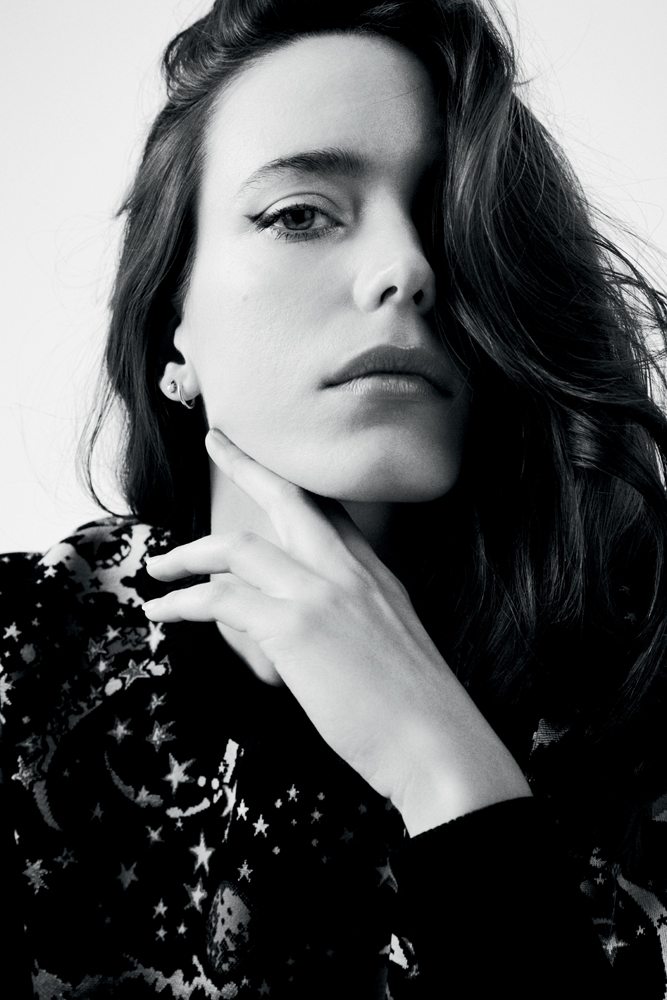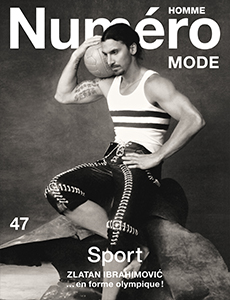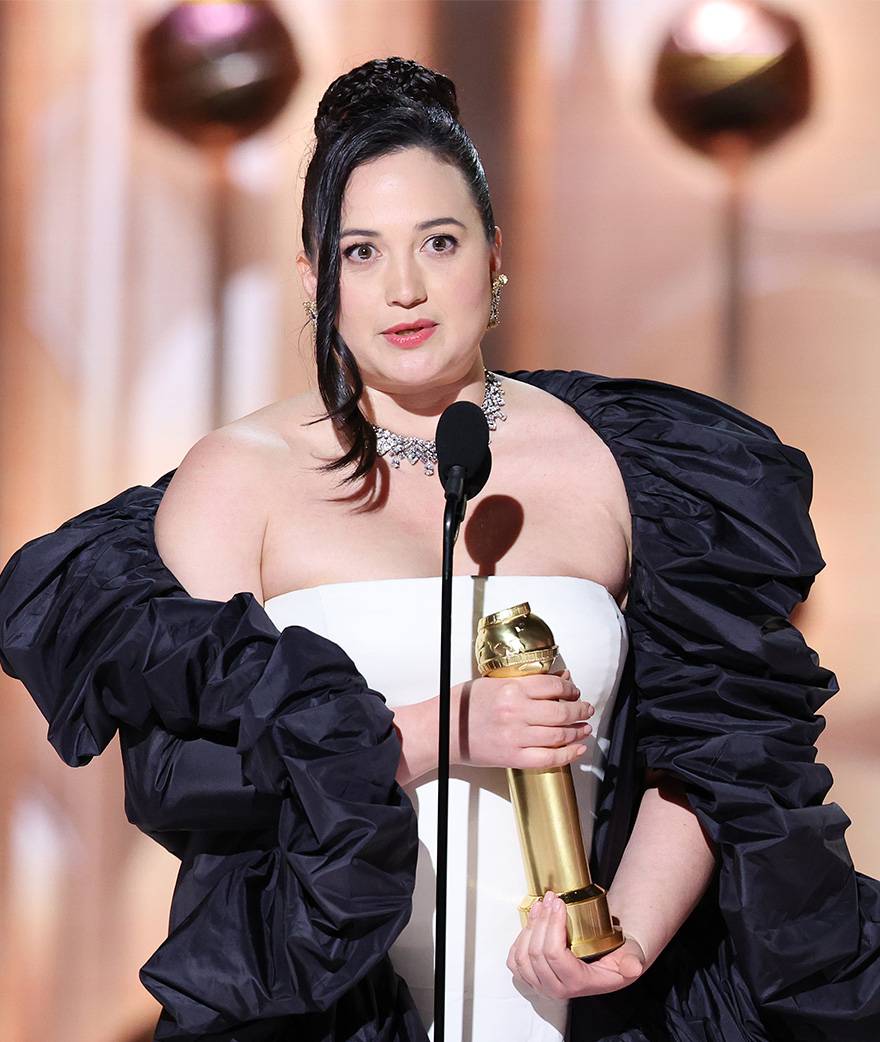

Numéro: When Nicole Garcia was asked why she wanted to become an actress, she replied, “For a look that I wasn’t getting.” Is it the same for you?
Stacy Martin: To a certain extent perhaps. Let’s say that acting has opened my mind – particularly through the discovery of wonderful plays by Chekhov and Beckett – and has allowed me the freedom not to be confined within myself. By plunging into different psyches, I suddenly had answers to the questions I’d often been asking myself about other people. It was liberating.
So the possibility of escaping oneself to become someone else is a form of therapy?
For sure. The more I act the more I understand to what point our identity and emotions are malleable. During a shoot, I might play a character who’s the complete opposite to me and live her emotions to the point of defending them. It’s very real, and then suddenly you have to stop acting, the shoot is over, I return to my life, my family, my boyfriend...
Charlize Theron said that she adored exploring the psyche of a serial killer in Monster [2004]...
I haven’t yet played a serial killer, but it’s a role I’d love to try because it’s extreme. When I choose my scripts, I look for characters that go against what I’m like in real life. It was the case with Lisa in Amants, who frightened me because she’s a very “straight” woman, and I, Stacy, am not at all like that... If the role is going to be uncomfortable for me, if it will require me to put a lot of energy and effort into making it believable, then I say to myself that I really must do it.
Yet you often play very cold intimidating women like in Joann Sfar’s La Dame dans l’auto [2015] with glasses and a rifle, Benoît Jacquot’s Dernier Amour [2019] and even in Amants. Are they really the complete opposite to you in real life?
It’s true that all those women sort of have something in common – it’s as though all three were in a permanent headlong rush. Personally I’m much more contemplative... But then you could also say that, like them, I’m extremely tenacious!
That’s a characteristic that must have helped you get your first break in cinema, a role in a film by Lars von Trier...
Not really. In fact it was all very unlikely: I’d come to audition for a soap advert – a ridiculous thing which required me to pretend to throw water on my face – and the casting director had me do the Nymphomaniac audition instead. So I’m very glad I didn’t do that ad! [Laughs.]
You were talking about uncom- fortable roles – but uncomfortable is almost a euphemism when you’re playing a sex addict!
Playing Joe required a lot of open-mindedness, for sure! When the character is addicted to sex, alcohol or gambling – something I explored with Marie Monge in Joueurs –, you need to find empathy for that deviant behaviour and ask yourself why the character is like that.
Does it bother you being constantly associated with Lars von Trier’s Nymphomaniac?
A bit... But I get it, since it’s pretty unusual to start out with Lars von Trier! For the first two or three years after the film came out, it was frustrating, because I wanted to prove I was capable of playing other roles. Today I understand just how crazy it was: I came out of nowhere, I hadn’t done anything before, and I’d only just found myself an agent... So no, I don’t mind talking about it, but it depends on the questions. I’m very happy to talk about Lars – I think he’s one of the last great contemporary directors –, but when people constantly want to know about the nude scenes or the fact that I had a porn-actress body double, well after, a while, frankly who cares?
It often seems that once an actress lands herself an important role it eclipses all the others in the public’s perception of her...
After that kind of role, you need to work to redefine yourself. It’s very striking, especially for actors who land roles in big franchises, like Shia LaBeouf, who did the Transformers trilogy. If he followed it up with Nymphomaniac, it was in part precisely because he needed, or wanted, to do something else. In my case, the fact of having worked with Lars von Trier opened the doors of cinéma d’auteur to me and allowed me to work with other directors of that type, some of whom had also worked with him, like Brady Corbet [Vox Lux, L’Enfance d’un chef ].Without Nymphomaniac, I think it would have taken me a lot longer to get where I am today. So, to come back to your question, no it doesn’t bother me that that role is going to define me for the next ten years. In fact I’m proud of it.
Amants was shown at the Venice Film Festival, where Quentin Dupieux’s Mandibules was a big success... Did you see it?
I didn’t get to see it in Venice, but I can’t wait to watch it when it comes out. I did get to see Mona Fastvold’s The World to Come though, which I thought was really fantastic. It’s about two women who fall in love in the 19th century...
It’s kind of the American version of Portrait of a Lady on Fire, no?
You think so? I really liked the sim- plicity – the film never overdid the emotional side. Everything you see today seems to be about tears, psy- choses, emotions...
Does emotion bother you?
It bothers me very much when that becomes the only criterion for producing films and praising them. As though a film were only successful if it makes the whole audience cry! Last year I was one of the jurors at Venice, and of the 21 films I saw an awful lot of them were tragedies. Take that side of things away, and there wasn’t much left... But I loved Martin Eden, not only because Luca Marinelli brings a certain ardour to the character but also because of the directing. Pietro Marcello used montage in a very subtle way – if you compare the first and second halves, the images are different... I find that fewer and fewer people make good cinematic choices.
In Delphine Seyrig’s documentary Sois belle et tais-toi [Just Look Pretty and Shut Up], Anne Wiazemsky, Jean-Luc Godard’s second wife – who you played in Le Redoutable [2017] – says that directors don’t like it if actresses comment on the script. Has that been your experience?
For me there are two types of script: works of art that shouldn’t be fiddled with, and others which are sometimes lacking the poetry that I love so much. With the second type, I tend to question them more, and then we make changes in tandem with the director during rehearsals or sometimes during shooting.
So there are those that are perfectly written and then all the rest... What about directors? For you, what’s the difference between taking direction from Michel Hazanavicius and from Nicole Garcia?
Michel is a child who’s just worked out that Father Christmas exists and that he’ll be able to spend his whole life in the playground. He knows how to have fun, but he’s also a perfectionist. When we were shooting Le Redoutable, we’d do a take and suddenly he would stop everything because a curtain fold wasn’t right! In fact, he wants to create a sort of tableau vivant. Nicole is looking for something: the scene, the shots... If things don’t work out, she’ll suddenly change everything, replacing a static indoors scene with an outdoors scene in movement. When I got the role of Lisa, I ran into Marion Cotillard in Cannes, who congratulated me and told me I should go for it. She was right: with Nicole you have to go into it head first, there’s a very particular energy, it’s like you’re in a laboratory. I loved it!
Claude Lelouch also improvises a lot. In his film Un homme et une femme there’s a scene where Jean-Louis Trintignant asks a question that I’d like to ask you now: why do you think cinema isn’t taken seriously?
I think there are different cinemas and that they’re evolving a lot, especially with the emergence of series and streaming platforms. In the industry, everything is commercial, the choices are made for financial reasons and everyone forgets that cinema is an art... That’s why I make more films in France than abroad: I like the fact that there’s a real consciousness of cinema as an art. People go to see the new releases every Wednesday, it’s a fixture in the calendar, there are government subsidies, even if they’re being cut and it’s complicated, but it’s nothing like the situation with British cinema, for example, which is on the verge of disappearing, or with Italian cinema, which disappeared for years and is now slowly coming back... It’s diffi- cult! Platforms like LaCinetek or Mubi are great, you can watch old films like Un homme et une femme, art films, experimental films... They remind us of the beauty of cinema.
Nicole Garcia’s film Amants is scheduled for release in January 2021.









